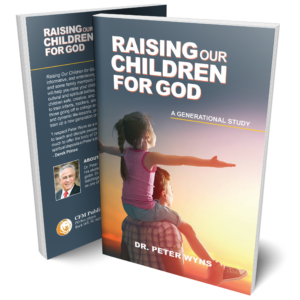I am referring to my favorite father in the Bible. I am not talking about my Heavenly Father or my own dad or grandfather; of course, they would be my favorites. No, I am looking at Bible characters. When I search for natural (not spiritual) fathers in the Bible, I do not see many references to them or to the daily interaction with their kids. One, however, jumps out at me because of two verses. The man is Philip, and here are the verses: “Leaving the next day, we reached Caesarea and stayed at the house of Philip the evangelist, one of the Seven. He had four unmarried daughters who prophesied” Acts 21:8,9. My deep appreciation for Philip comes because of what the Bible tells us of his ministry. It also comes because of what I have seen in the lives of men in the ministry today. It is challenging for a man to sacrifice his life for the ministry and still be a great father. I watched my own father negotiate this challenge and I have walked this road as well. Serving the Lord in full-time ministry can be extremely demanding. Fulfilling one’s calling requires an enormous sacrifice of energy, time and heart. Being a good father also requires a huge focus of energy, time and heart. Philip is a man who did both.
The Pain of Loss
Too many parents in the ministry have seen their children rebel, turn away from the faith and break relationships with their family. Like the men of Ai who went out to war and turned to see their homes on fire, many ministers have fought intensely for their church family only to turn and see ruin in their personal families (see Jos. 8:16-20).
The pain of such loss is unbearable and it can happen to the best of ministers. Our heartfelt prayers and compassion go out to such parents and to such children. In most cases, over time, these families will be partially restored. This usually happens after grandchildren are born and hearts become more tender. Often, however, the healing process takes decades and, even then, family life is strained.
We can learn some things from Philip, who was an outstanding minister and an excellent father as well. It seems that he did not need to lose one challenge, to meet the other.
The Ministry of Philip
Philip is first mentioned in scripture when he is chosen, out of thousands, to administrate care and give service to the poor widows of the church. He is chosen because he is full of the Holy Spirit and wisdom. He is a ministry servant, a leader, and he speaks both Greek and Aramaic. He is a very gifted man, yet he is willing to serve as a deacon.
One of the reasons that Philip’s daughters become powerful women of God is that he included them in the work of the ministry as they were growing up. No doubt, Philip’s wife and daughters assisted him in the ministry of serving the widows with food and care. These young girls were becoming ministers in their own right at a young age.
The second time we read about Philip is during the time of great persecution against the Christians in Jerusalem. They are scattered and Philip, and his family, move to Samaria. He would not leave his family behind because of the excessive violence against the believers in Jerusalem. Perhaps he has extended family in Samaria and has a place to stay.
Immediately, upon his arrival in Samaria, Philip begins to preach about the Lord Jesus. Many people are saved, delivered from demons and baptized. It is most likely that his daughters are ministering along side of him. Revival comes to the city because of Philip and his family. Soon after, the apostles from Jerusalem come and continue the work of discipleship and church building that Philip and his family birthed.
It seems that the situation for his family became stable and Philip was called away by the Lord to go into the desert. There he met the Ethiopian eunuch, introduced him to the gospel and baptized him. This led to the birth of the church in Ethiopia.
Immediately after Philip finished baptizing the eunuch, he was translated in the Spirit and taken away to Azotos. He preached the gospel there and also in every city as he made his way north. He finally settled in Caesarea, on the Mediterranean coast.
Then Philip worked with his hands, raised money to live on and sent to Samaria for his family to join him.
By the time Paul and his companions arrive and Agabas the prophet comes,
Philip has established himself with a large home and a reputation for hospitality and Church leadership.
Who is This Man?
From his story, here are some of the attributes that we can see in Philip:
Humble Servant (Jerusalem)
Compassionate to the Poor (Jerusalem)
Administrator of ministries (Jerusalem)
Miracle Worker (Samaria)
Preacher to thousands (Samaria)
Scholarly Teacher (To the Ethiopian)
Baptizer with Authority (The Ethiopian)
Hospitable to Ministers (Caesarea)
Acknowledged Leader (Caesarea)
Evangelist to the Unsaved (Many Cities)
Generous as a giver (Caesarea)
Spiritually Mature (Caesarea)
A supporter of women (His Daughters)
Personal Father (Daughter’s confidence)
Protector of His Family (Unmarried Girls)
Hard Working Man (Builds Large Home)
He is connected with the network of ministers. He encourages and ministers to them and his family, and he is led by the Spirit
Philip’s Life
Caesarea was a boom town, second only to Jerusalem in importance. Its population was half Jewish and half Gentile and was the largest city in the nation. It had been built from just a tiny town to one hundred thousand inhabitants in just forty years. It was the main sea port and the headquarters of the Roman Army. There was no shortage of available jobs for someone who
wanted to work hard. Philip worked hard with his hands to provide for his family and establish a grand house for the purpose of the ministry.
Philip’s Children
Philip had four unmarried daughters, which means they were adults. They were confident, fearless women yet they lived in a land where women were to be quiet. These ones prophesied.
They prophesied because of their father. He included them in the ministry, gave them the opportunity and spoke encouragement and approbation into their lives. They would not be mentioned in the Bible if their lives were not extraordinary. They had a great father.
Philip was an outstanding minister but he was also an amazing father. He trained, promoted and loved his daughters. With all of his amazing ministry, he still paid great attention to his girls.
Ministers and Fathers
Each of us should press forward into the service of the Lord as far as we can. Some will minister in business, politics or community service, while others will serve in the Church; all of us have been called. We should be sacrificial ministers of the Gospel, for there is no other way to see God’s kingdom grow.
While being great ministers, however, we must be great fathers. The two can go hand in hand if we include our families in everything we do. They should walk by our side at a very young age and we should find a creative way to keep them involved. When they mature, they may branch out into other ministries but still be in step with the Lord and with their godly father.







Leave a Reply